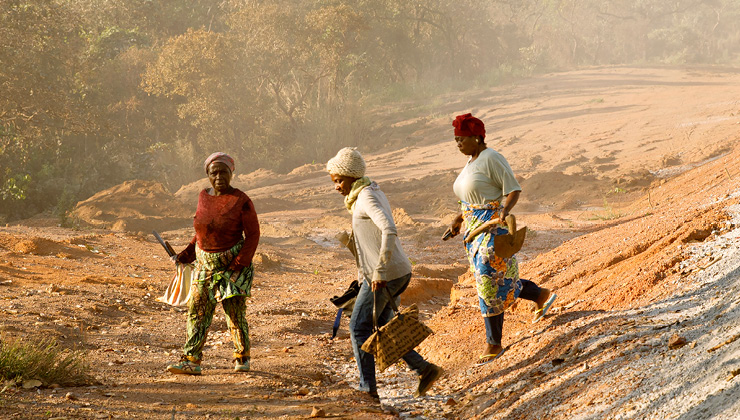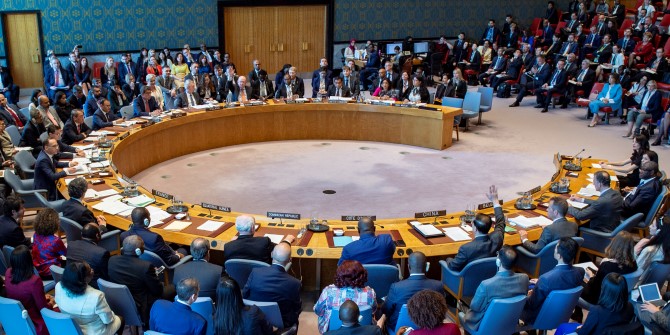The ‘Comfort Women’ of World War II introduced many to the existence of conflict-related sexual violence. Christine Chinkin, whose work in the field began with the Women’s International War Crimes Tribunal in Tokyo, argues that the UNESCO ‘Memory of the World’ provides an essential opportunity to preserve the women’s testimony and acknowledge the crimes committed.
Thanks to the work of Japanese professor of history, Yoshiaki Yoshimi, women’s activist groups across Asia, and the bravery of the women themselves in speaking out about their treatment at the hands of the Japanese military during World War II the story of the so-called ‘comfort women’ is now well known. From the early 1990s, their fight for justice through the UN human rights institutions, through national courts and through a ‘peoples’ tribunal’, the Tokyo International Women’s Tribunal (2000), has been contemporaneous with the greater awareness of the incidence and seriousness of sexual violence in armed conflict. We now have a body of jurisprudence, notably from the International Criminal Tribunals for former Yugoslavia and Rwanda, provisions in the Rome Statute for an International Criminal Court and in 2016 the first conviction before that Court for rape and sexual violence as a war crime and a crime against humanity. The Women, Peace and Security agenda that has evolved from the adoption of UN Security Council Resolution 1325 has at its core the recognition that conflict is gendered, that women and men understand and experience conflict differently, and that women’s lived knowledge of conflict must be taken into account in law, in peace processes and in reparations as much as that of men. Protection against sexual violence in conflict, prevention of such atrocities, and relief and recovery, as well as the importance of women’s participation and empowerment, constitute the pillars of WPS: the comfort women have embodied both the need for recognition of such agency and innovative ways of expressing it since the early 1990s.
However many of these women have died and those surviving are now very old. It is essential that the memory of the atrocities they endured as sexual slaves and of their part in raising awareness of the prevalence of such crimes as a tactic of war does not die with the last of the survivors. This eventuality is lessened by the records of their story in a wealth of documents located in archives across many countries, including in their countries of origin, the United States, United Kingdom, the Netherlands and, of course, Japan. The importance of honouring their memory and preserving these written records sufferings lies behind the application made to UNESCO that they become part of its documentary heritage, the ‘Memory of the World’.
The documents submitted to UNESCO register fall into three categories. The first category is that of public documents that make clear the role of the Japanese state in constructing the ‘comfort’ system, in financing and maintaining it as long as their military activities continued. The second are the most poignant – the private papers of the victims, and their testimonies. Third are documents recording the activism and campaigning of women’s non-governmental organisations that have worked with the survivors to achieve official recognition and acceptance of responsibility for the crimes that were committed against them.

By Lemon A E (Sergeant), No 9 Army Film & Photographic Unit, via Wikimedia Commons
Together these documents create a rich archive, a library of suffering. They also provide a wealth of detail about the organised and systemic nature of the supply of sexual slaves to the Japanese military, revealing its integral part of the Japanese war effort. But it is also a record of the voices of those who are normally excluded from military history – the voices of women, the marginalised and isolated survivors of wartime crimes of sexual violence and who protest and reject the primacy of military necessity. It is finally an archive of resistance by those activists who have worked for decades to ensure that this alternative history, a history written from below is not forgotten and that the stories that are memorialised are not only those of the victors, of the military men and politicians who fought the wars.
The vision behind the UNESCO register is that ‘the world’s documentary heritage belongs to all, should be fully preserved and protected for all and, with due recognition of cultural mores and practicalities, should be permanently accessible to all without hindrance.’ Documents preserved in this way have more than individual, or even national significance, but rather are of global importance. The persistence of the ‘scourge’ of sexual violence in conflict across continents and the way that it continues to ‘ruin lives, destroy families, break up communities and prevent societies from achieving sustainable peace’ make their unique testimony of such violence of universal and ongoing concern. Their quality as testimony to the contribution of the four pillars of women, peace and security to the maintenance of international peace and security ensures their continuing relevance. And the disappearance of the individual and collective memories of the women as a holistic archive would, to draw on the UNESCO Convention on the Protection of Natural and Cultural Heritage (1972), be a ‘harmful impoverishment’ of the heritage of humanity.
A ‘right to truth’ – a ‘right to an accurate account of the suffering endured and the role of those responsible for that ordeal’ has been articulated by members of the Grand Chamber of the European Court of Human Rights, not just for those directly affected but for all people. (El-Masri v The Former Yugoslav Republic of Macedonia, Judges Tulkens, Spielmann, Sicilianos and Keller) Preservation of these documents stands as a bulwark against those who would deny these particular crimes, and the continued reality of sexual and gender-based violence in contemporary conflicts. As such preservation of memory may also serve as some deterrent to repetition.
But Japan would like this memory to be erased. As the last surviving women grow older it must be looking forward to the time when there are no longer living voices to accuse, to remember and to demand reparation. It is therefore attempting to ensure that the documents do not come to form part of the Memory of the World. This must not be allowed to occur and those concerned to prevent sexual violence in armed conflict must show their support for this submission.
The views, thoughts and opinions expressed in this blog post are those of the author(s) only, and do not reflect LSE’s or those of the LSE Centre for Women, Peace and Security.





